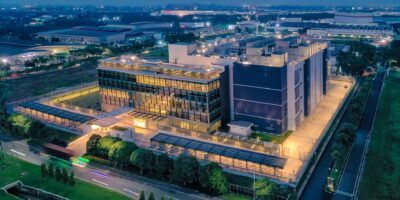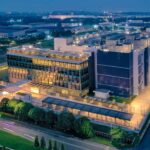
(Source – Shutterstock)
YTL, SUPERNAP announce solar-powered data centers plans in Malaysia and Thailand
With sustainability on the agenda for most organizations, data centers are also doing its part in ensuring it can lower its carbon footprint and lead a greener approach toward digital transformation.
According to the International Energy Agency, data centers consume approximately 200 terawatt-hours (TWh) of electricity, or nearly one percent of global electricity demand, on a global level. They also contribute to 0.3% of all global CO2 emissions.
In Thailand, SUPERNAP (Thailand), the first Tier IV, carrier-neutral, hyperscale data center will now work with WHA Utilities & Power (WHAUP) to power its hyperscale data center. The project will help SUPERNAP reduce electricity costs significantly throughout the system’s life while offsetting 18,250 tons of CO2 emissions to the environment.
“WHAUP has been chosen to install the solar power system at SUPERNAP (Thailand) because of its expertise in engineering and safety and its solid experience in the installation of solar power systems. We are confident in the skills and professionalism of the company” said Sunita Bottse, Chief Executive Officer of SUPERNAP (Thailand).
The solar farm will be built on SUPERNAP (Thailand)’s land on the data center premises located in the Economic Eastern Corridor (EEC), outside the Bangkok flood zone and close to the international network landing station with links across the country of Thailand.
The agreement between the two companies includes engineering, procurement, and construction (EPC), as well as an energy storage system to store excess power and reuse it when the solar energy system cannot generate enough power to satisfy the demand. Furthermore, WHAUP will be responsible for the operation and maintenance of the system for 20 years. The project, which is scheduled for completion this year, began in early April.
Solar-powered data centers
Over in Malaysia, YTL Power International Berhad, through its subsidiary YTL Data Center Holdings Pte. Ltd. (YTL DC) has announced the development of a 500MW data center campus in Johor, the first data center park in Malaysia to be powered by renewable solar energy.
Located 30km from Singapore in the Iskandar region of Johor, the YTL Green Data Center Park will offer diversity in power and connectivity on a large industrial site, of which 275 acres will be dedicated to data center development. This provides excellent opportunities for customers seeking green data centers to meet their needs. Work has started on the first 72MW data center, expected to be in service by Q1 2024, with more in the pipeline.
Dato’ Yeoh Seok Hong, Managing Director of YTL Power commented, “With the development of the YTL Green Data Center Park, we are driving the expansion of our infrastructure platform to the digital age by combining our expertise in renewable energy, property development, telecommunications, and data centers. This project will be the flagship of our integrated data center vision to serve our customers in the wider Singapore region, as well as a catalyst for our regional expansion in this space.”
YTL DC also plans to use its expertise in renewable energy, telecommunications, and construction to develop new data center campuses across the Southeast Asian region. The YTL Green DC Park will also have dark fibre connectivity to Singapore, due to its close proximity to the country.
Companies with operations in Singapore can now look to expand, complement and optimize their data center processes. Dark fibre connectivity will provide direct and ultra-low latency network connections to data centers in Singapore and other locations in Malaysia.
YTL DC announced its acquisition of Dodid Pte. Ltd last year, the owner of a 12.5MW, Tier-III data center in Singapore spanning 42,000 sq ft. In addition, works are underway to expand and upgrade the group’s 5MW Data Center facility in Sentul, Kuala Lumpur to Tier-III standards, offering customers a strategically located site in the heart of Kuala Lumpur with close proximity to key internet exchange hubs.
READ MORE
- The criticality of endpoint management in cybersecurity and operations
- Ethical AI: The renewed importance of safeguarding data and customer privacy in Generative AI applications
- How Japan balances AI-driven opportunities with cybersecurity needs
- Deploying SASE: Benchmarking your approach
- Insurance everywhere all at once: the digital transformation of the APAC insurance industry


